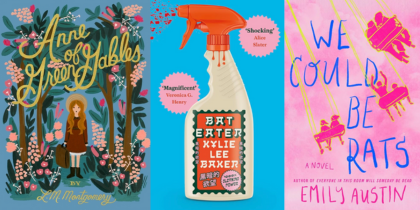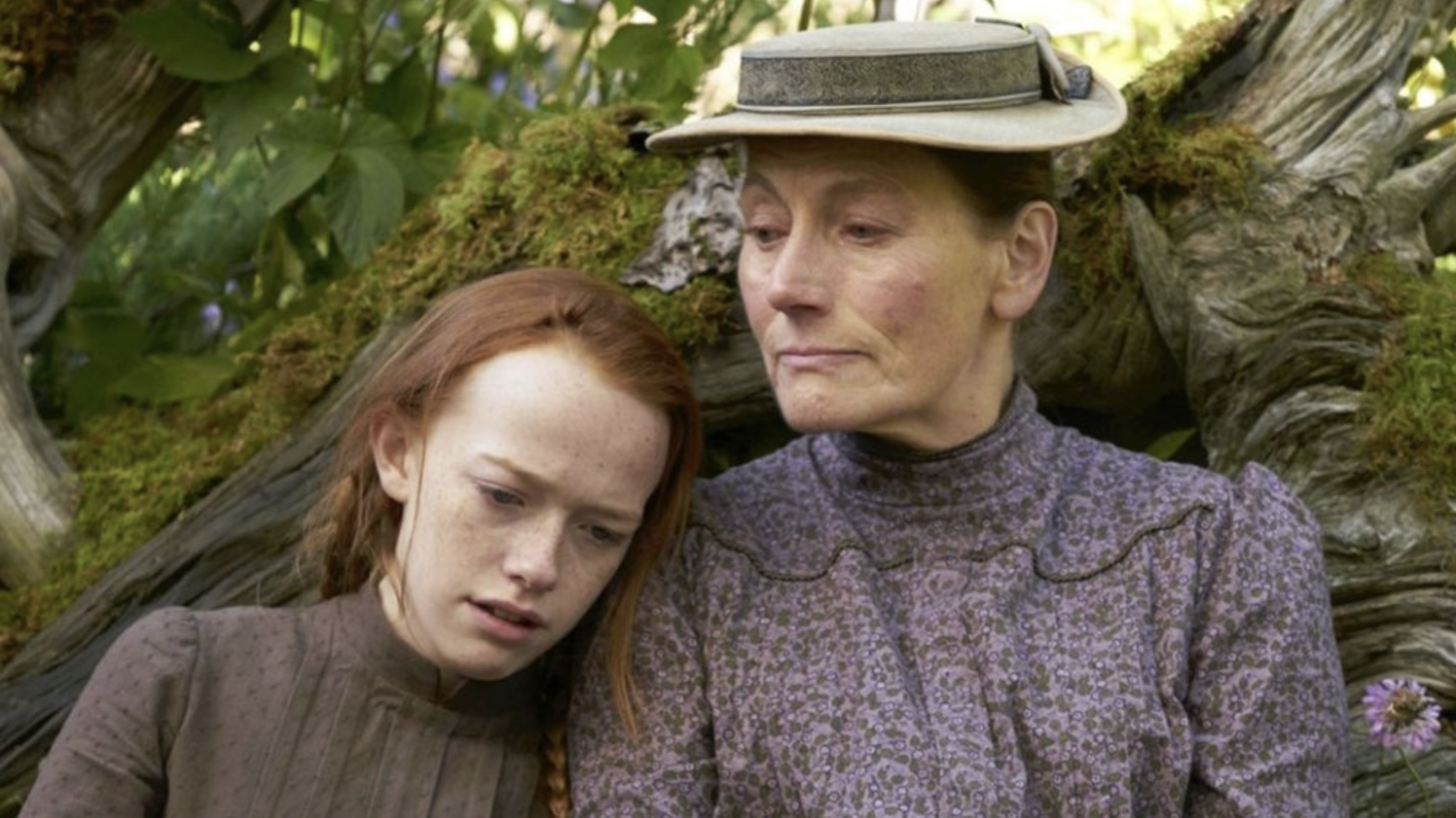Sorry, Was Engrossed In Sad Book: My April 2025 in Media
Normally, when looking back at my month in media consumption, I have a list of books 4 - 10 long, a show or two, and on the wild occasion, a movie. But this month (and, naturally, the first one I’m talking about in this newsletter/blog thing) things are wildly inverted thanks to two factors:
I’ve been reading through a fairly large stack of screenplays for a competition I’m helping judge, which has chewed up all my reading-for-fun-and-general-self-improvement time, and
I’ve been knitting a jumper, and something about knitting calls for screen time over audiobooking.
I’ve also consumed an unholy amount of hours in political and economic podcasts, but for the sake of everyone’s sanity, we’re not going to talk about that right now.
I’ve been making monthly montages out of the contents of my phone’s camera roll. Meet April!
BOOKS READ:
ANNE OF GREEN GABLES by L.M. Montgomery (1908)
Format: Audiobook (narrated by Rachel McAdams)
A short story of mine vaguely inspired by Anne Shirley and the Cuthberts was recently accepted for publication in a very cool magazine, so Anne of Green Gables has been on my mind a bit lately. And when the other book I started right before this turned out to be the actually scary kind of horror book, I thought, “Now’s the time for a reread, baby. You deserve something nice.”
And nice it was! The story of a highly imaginative, easily distracted orphan turning up to the farmhouse of two unmarried middle-aged siblings on Prince Edward Island by mistake is as effortlessly charming as its fatally red-haired protagonist. Anne’s romantic monologues are balanced effortlessly by the gruffly practical (but mostly kind-hearted) adults around her, and even more so by the wry commentary of its narrator. An absolute hoot was had, right up until it had me sobbing in the corner of the kitchen. Real life affirming shit. Treat yourself, or, if you have kids and don’t mind overt Christian values, it’s a solid candidate for bedtime reading.
BAT EATER by Kylie Lee Baker (2025)
Format: Paperback
Maybe it’s the absolutely silly cover Hachette chose for this book, but I did not expect this part-serial killer thriller, part-ghost story horror book to give me the willies as badly as it did. And I mean that as a compliment!
Bat Eater (published in the US as Bat Eater and Other Names for Cora Zeng) follows Cora, who, after seeing her sister brutally murdered in a hate crime at the beginning of the COVID-19 pandemic, takes a job as a crime scene trauma cleaner in Chinatown where she begins to notice a disturbing pattern of unreported murders that may be connected to the death of her sister — and sees her on the list of potential victims. Which would be stressful enough, but Cora’s superstitious Auntie Zeng (and her superstitious co-workers) keep warning her about “ghost month:” the month in which the unappreciated and hungry dead come back to punish their loved ones. And Cora, with all her mixed feelings, trauma and denial, hasn’t been mourning her sister in any of the ways she should.
Bat Eater is gnarly. It’s goopy, gory, violent, sad, and oozing with dread. Baker has recreated the densely anxious air of COVID-19 lockdowns, painting an empty city in crisis. It’s a fascinating exploration of white supremacy, anti-Asian racism, the particular brand of misogyny that leads to the exploitation of Asian women, political corruption, youth malaise, passivity as a fatal character flaw, and the power of cultural connection. I had a horrible time, which again, I mean as a very high compliment. Top notch contemporary horror, and an absolutely banger use of ghosts.
WE COULD BE RATS by Emily Austin (2025)
Format: Paperback
An absolutely rare month in that I read not one, but TWO brand new releases, and loved the shit out of both. But that was expected in this case, at least. I’ve now read all three of Emily Austin’s published novels and she has made an eager fan out of me.
We Could Be Rats is something of an epistolary piece told in letters and journal entries, and follows two sisters, one of whom is trying to understand the suicide attempt of the other. It’s heavy and emotional, but really beautifully pieced together. I’m so thrilled to see Emily Austin continuing to explore her usual themes (mentally ill Canadian lesbians with big hearts and big trauma Doing Their Best) while really stretching her craft muscles and experimenting with different narrative structures and devices.
I was so engaged (i.e. crying) while reading a certain section of this book that I missed a text from my partner, and when I finally saw it half an hour later could only respond with, “Sorry, was engrossed in sad book.”
Again, highest compliment.
MEDIA WATCHED:
TWIN PEAKS: THE RETURN (2017)
Owned on Blu-ray
Like many other David Lynch fans, my partner and I started rewatching Twin Peaks shortly after his death in January, and April brought the soapy and surreal journey to a close. We watched Season 3 as it aired back in 2017, which was a wild, entertaining, often beautiful but ultimately befuddling experience for me. I liked it, but I didn’t get it, and the fact that I didn’t get it frustrated me a little. But I’ve diligently spent these past eight years getting weirder, more creatively open and, I hope, interesting, and so I went into The Return not trying to understand it, but only to experience it. And mates, I loved it. Twin Peaks was always more soap opera than police procedural or small town mystery, and The Return keeps the spirit while beefing up the experimental elements that made seasons one and (parts of) two so special. I don’t love everything about it, and I think Lynch was pretty exploitative of the bodies of Black and Asian women, while giving them little actual screen and character time. But overall, it was a journey well worth taking again.
This is the arm, and it sounds like this: “psbpsbpsbpsbpsbpsbpsb.”
CONCLAVE (2024)
Rented on Apple TV, then immediately purchased on Blu-ray
Continuing on the theme of media I watched because someone died, I used the Pope’s death (RIP to an unprecedentedly pretty progressive one, relatively speaking) and the presence of Isabella Rossellini to sell my partner on finally watching Conclave: a movie centred around the process of electing a new pope. I went into this knowing very little other than the premise, and that people around the time of the Academy Awards had joked about Conclave being behind the self-elimination of a few of the leading nominees, so I assumed it was going to spin into some sort of Drop Dead Gorgeous situation with cardinals. What I got instead was a quiet, beautifully shot piece about grief, duty, and making good choices. I immediately bought it on blu ray so that I can appreciate the shots in non-streaming fuzz (our internet is… not great) and also so I can put it on whenever I feel sad. A feel good movie about papal politics. Who knew!
All those moments will be lost in time, like cardinals in the rain.
THE PITT (2025)
Streamed on MAX
I am a big baby with medical anxiety and an accident prone partner, so when everyone first started talking about (mostly) realtime medical show The Pitt I lasted exactly twenty minutes before I had to turn it off and have a prolonged cuddle with my dog. But then everyone in the discord started watching and raving about it, so I caved and tried again. This time with self-protection measures: I only watched it on my phone or laptop screen (thus reducing chance of seeing anything terrible, because this show has decided to go for a realism I have never craved in medical dramas) and only while knitting, to reduce my chances of paying too much attention to any of the medical talk. So I basically turned this into a radio play that I paid a bit of attention to. Is this the ideal way of watching TV? No. Does it cause me pain as someone who writes TV? Yes. But it eased me in, and then somehow I watched (listened to?) all 15 episodes of it over three days. I’m tempted to give it its own blog because I also happened to watch it the week that Katy Perry and friends went to the exosphere, which is a combo that provoked a lot of Thoughts. But the tl;dr is that I ultimately enjoyed it a lot once I made it baby-proof. The characters are great, the shift format allows for some really interesting cast relays, and I’m genuinely impressed by how a real-time show managed to find an engaging hook/cliffhanger at the end of nearly every episode. And, honestly, I’m just so happy to see another weekly release show with what seems to be a yearly commitment and a decent episode count. TV IS COMING BACK, FOLKS. NATURE IS HEALING.
Middle-age is really working for Noah Wyle, professional TV doctor.
BAND OF BROTHERS (2001)
Streamed on MAX
This show about American paratroopers in WW2 was a prestige television super event in 2001, which I completely missed, having been only fourteen at the time. It is absolutely brimming with baby British actors playing Americans, many of whom went on to be megastars (Andrew Scott, James McAvoy, Michael Fassbender, Tom Hardy) and more than any other show it has made me wonder if I am face-blind because I cannot for the life of me tell the difference between 90% of these muddy brunette men. The production values are very high. The photography is quite beautiful. The performances are very good. I cannot imagine writing a script with this much group chat, so I’m impressed on those fronts, but I don’t know that I love the narrative framing of it all. It’s a good show told messily, but I think that’s probably a purposeful choice in reflecting the chaos of war. It might just be too much of an ensemble show for me. I cannot remember a single person’s name other than Major Winters. Good for knitting in front of, though, if you don’t mind all the screaming.
Noted American Hero, Damien Lewis.
ANDOR and THE LAST OF US (2025)
Streamed on Disney+ and MAX respectively
I am, of course, watching the two big, highly anticipated, mega budget franchise second seasons, and will probably give each a separate blog or two as they’re both prompting a WHOLE LOT of thoughts. But at time of writing, only three episodes of each show are out (with the next batch of Andor dropping today) so all I’ll say right now is that I’m mostly impressed and intrigued, with a few reservations on both sides. But I don’t think anything is going to happen this year that’ll top Mon Mothma getting absolutely crunk and dancing the pain away at her daughter’s childbride wedding in terms of sheer emotional and aesthetic extravaganza.
We call this a Chandrilan Doof.
This piece was originally posted on Substack on April 30, 2025








